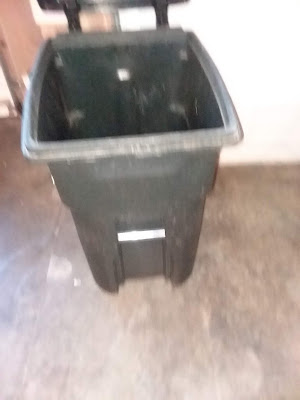Throw Your Gold in the Trash
What do you consider valuable in your life? When we hear the word “valuable” or “priceless” we often think of money or precious gems. What we think of as valuable and what truly is valuable are often very different things. How much do you value your relationship with God? Can you say that everything else feels like trash compared to God?
In the Book of Job, Eliphaz gives us some great life wisdom. The Book of Job is considered “wisdom literature”, which means (like Proverbs and Ecclesiastes), it contains many pithy sayings on life. We often miss the great wise sayings found throughout Job, because we focus so much on the grand idea of “why do we suffer” (which The Book of Job actually does not answer directly).
Eliphaz accuses Job of withholding his material wealth from the poor (Job 22:7-11), which explains, in his view, why Job is being punished. So Eliphaz offers the following admonition:
“....If you remove injustice far from your tents; if you lay gold in the dust, and gold of Ophir among the stones of the torrent-bed, then the Almighty will be your gold and your precious silver. For then you will delight yourself in the Almighty and lift up your face to God. You will make your prayer to him, and he will hear you, and you will pay your vows. You will decide on a matter, and it will be established for you, and light will shine on your ways.” Job 22:23-28 ESVWhile Eliphaz’s reason for Job’s suffering is wrong, the wisdom of his admonition is exactly right. I think this passage is Eliphaz’s biggest message, namely because Eliphaz (which is a descriptive title, not a name) could mean “God is [fine] gold”.
Eliphaz’s admonition is for Job to “remove injustice from his tents”. In this dialogue, Eliphaz has accused Job of withholding his generosity from the poor, which is the injustice that he needs to remove from his tent. He tells Job that can be just through “lay[ing] your gold in the dust and [lay] the gold of Ophir among the stones of the torrent-bed”. Eliphaz is suggesting that if Job stops valuing his material wealth and is generous then his relationship with God will be restored. While this point is wrong, the wisdom is found in Eliphaz’s suggestion to consider his wealth worthless in order to gain God.
When Eliphaz told Job to “lay his gold in the dust”, he was telling him to taking something considered very valuable and to mix it in with something considered worthless. When he told Job to throw the gold of ophir in the gorges he is saying the same thing. In those days, the Gold of Ophir was considered the most valuable and fine gold there was. By throwing it in a “torrent-bed”, or “ravine” or “gorge” he is telling him to take something priceless and make it worthless. A similar concept today would be throwing money or a precious metal in a trash dumpster alongside your leftover food.
Only by considering the priceless worthless could God become like gold,
“Then the Almighty will be your gold and your precious silver. For then you will delight yourself in the Almighty”.When we remove the love of money from our lives, we can focus our energy on fully loving and enjoying God. Eliphaz understood this concept long before Paul did,
“But whatever gain I had, I counted as loss for the sake of Christ. Indeed, I count everything as loss because of the surpassing worth of knowing Christ Jesus my Lord. For his sake I have suffered the loss of all things and count them as rubbish, in order that I may gain Christ” (Phil 3:7-8)
If our earthly possessions mean nothing to us, then God will be everything to us. It is an intentional and willful attitude and oftentimes a specific action that will lead us to throwing our valuables into the dirt and gaining God as our prize. What will the benefit be of gaining God?
“For then [when God is gold] You will delight yourself in the Almighty and lift up your face to God. You will make your prayer to him, and he will hear you and you will pay your vows. You will decide on a matter, and it will be established for you, and light will shine on your ways.” (22:26-28)
When we lower our possessions and elevate God we gain intimacy with him. We will desire to obey him and will we seek him in prayer. When we pray to him with a heart that values him above all, he will listen and honor our prayers. Through intimate prayers to God there will be clarity in our lives. This is not to suggest the “name it claim it” theology or that God is bound by our prayers, but a heart that loves God will be one that God listens to and will want what he wants.
Eliphaz' reasoning for Job’s suffering is wrong and is later condemned by God. Yet, Eliphaz is exactly right: we should consider everything worthless and consider God priceless. Then we will have intimacy with him and even when we don’t know what lies next in life, we can trust him and the path that he will establish for us.



Comments
Generosity is expected of all followers of Christ, for we are but stewards of God's blessings.